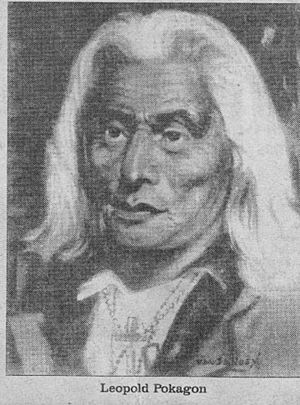Leopold Pokagon facts for kids
Quick facts for kids
Leopold Pokagon
|
|
|---|---|
 |
|
| Born | 1775 |
| Died | 1841 (aged 65–66) United States
|
| Nationality | Potawatomi |
| Occupation | Native American chief |
| Title | Chief |
Leopold Pokagon (born around 1775 – died 1841) was an important Potawatomi Wkema (leader). He became the main leader of the Potawatomi people living in the Saint Joseph River Valley in Michigan. A group of Potawatomi later took his name, becoming the Pokagon Band of Potawatomi Indians.
Contents
Who Was Leopold Pokagon?
Leopold Pokagon's early life is mostly known through stories passed down by his tribe. These stories say he might have been born into the Odawa or Ojibwe tribes. However, he was raised by the Potawatomi from a young age.
His name, Pokagon, comes from the Potawatomi word poké-igan. This word means "the rib" or "something used to shield." Just like ribs protect the heart, Pokagon was seen as a protector of his people. He later became a member of the Roman Catholic Church.
Pokagon's Leadership and Efforts
Pokagon became a very successful tribal leader after 1825. In the last ten years of his life, he worked hard to protect his Potawatomi communities. These communities lived in the St. Joseph River Valley.
Seeking Help from the Catholic Church
In July 1830, Pokagon traveled to Detroit. He visited Father Gabriel Richard to ask for a "black robe." This was a name for a Catholic priest. Pokagon believed that working with the Catholic Church could help his people avoid being forced to move from their lands. This was a big concern because of the Indian removal policies at the time.
That same year, Pokagon and his wife Elizabeth were baptized. Many other members of their group were also baptized by Father Frederick Rese. Father Stephen Badin then came to help the Pokagon Potawatomi. He started a mission for them in August 1830.
Protecting Land and Identity
By becoming Catholic, the Potawatomi of the St. Joseph River Valley created a new identity. They became known as the Pokagon Band of Potawatomi Indians. With Pokagon's strong leadership and help from Catholic missionaries, they were able to avoid being forced to move.
In 1833, Pokagon made a special agreement to the Treaty of Chicago (1833). This agreement allowed his group to stay on their ancestral lands in Michigan. Most other Potawatomi people were forced to move west of the Mississippi River. This was due to the Indian Removal Act of 1830. Pokagon used his group's conversion to Catholicism to secure this special part of the treaty.
Later, the Pokagon Band moved to L'Arbre Croche. This name means "land of the crooked tree." Pokagon used money from the treaty to buy land for his people. This land was in Silver Creek Township, near Dowagiac, Michigan. He bought the land in his own name, becoming a private landowner.
Uniting the Potawatomi Communities
Catholic Potawatomi groups across southwest Michigan and northwest Indiana looked to Pokagon as their leader. Villages in places like Hartford, Rush Lake, Dowagiac, Niles, and Buchanan in Michigan, and South Bend in Indiana, became united. They shared a common identity: Pokégan Bodwéwadmik dbéndagwzéwad (Pokagon Potawatomies they belong to).
In 1841, Pokagon got help from a judge named Epaphroditus Ransom. This help stopped the U.S. military from trying to remove the Catholic Potawatomi. This removal would have gone against the 1833 Treaty.
Pokagon's Legacy Today
After Pokagon died on July 8, 1841, there were legal problems over the Silver Creek lands. These problems caused difficulties for the community. Many people moved to other areas in southwest Michigan and northwest Indiana. The Potawatomi continued to work to get the payments and promises owed to them from treaties with the United States.
Today, the tribe is still known as the Pokagon Band of Potawatomi Indians. It is a recognized Native American Nation with over 4,300 members. Their main office is in Dowagiac, Michigan. They also have an office in South Bend, Indiana. The tribe's police force has a substation in New Buffalo, Michigan. This substation covers the tribe's casino, Four Winds New Buffalo.
Honors and Recognition
- The Potawatomi group took his name, becoming the Pokagon Band.
- Pokagon State Park in Indiana is named after him.
- A sculpture of Chief Pokagon can be found on the south side of the Knute Rockne Memorial. This memorial is on the campus of the University of Notre Dame.
Images for kids
 | DeHart Hubbard |
 | Wilma Rudolph |
 | Jesse Owens |
 | Jackie Joyner-Kersee |
 | Major Taylor |


